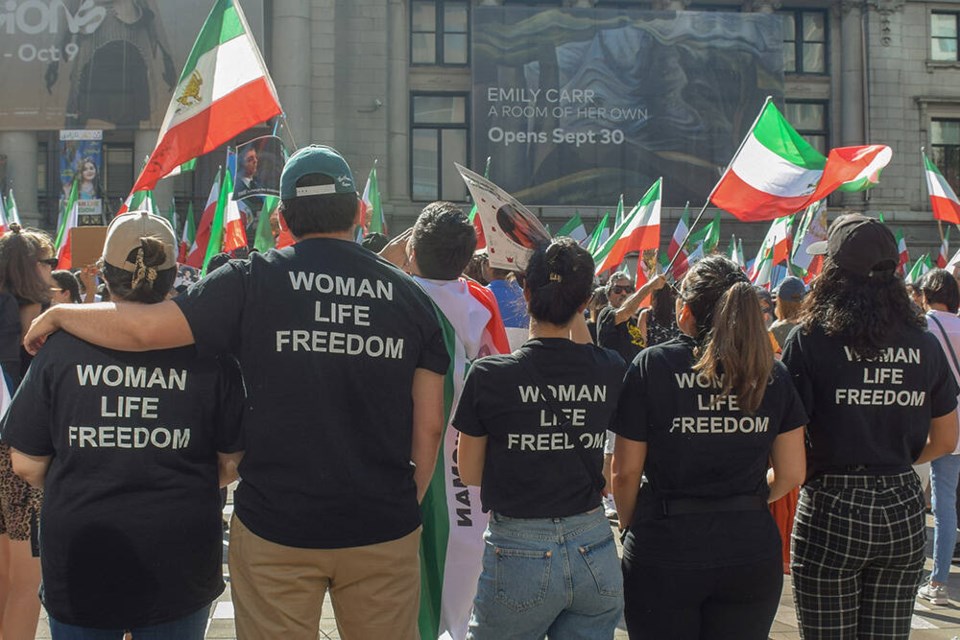Ebrahim Raisi, the president of Iran, died in a helicopter crash along with seven other people on Sunday, May 19, near the border of Azerbaijan.
While a funeral service was attended by thousands of mourners in Tehran on May 22, others of Iranian descent around the world, including the North Shore’s thriving Persian population, had different reactions to the death of the man sometimes referred to as the “Butcher of Tehran” or the “Ayatollah of Execution.”
In Toronto, images and videos posted on social media channels showed Iranians gathering and dancing in Mel Lastman Square on Monday, May 20. Similarly, In North Vancouver, the community responded to the news.
“I woke up to the sound of multiple messages on my phone from my journalist friends in Iran sharing the news,” said former Iranian journalist Mehdi Ghadimi, who now resides in North Vancouver. “In the last decade, the relationship between the Iranian people [both inside the country and the diaspora] and the Islamic Republic has turned into a confrontation, with the regime using brutal crackdowns against the people…. This has created unity among people inside and outside Iran against the regime. Now, when anyone associated with or appointed by this regime dies, it can be a reason for people to celebrate.”
Due to the restrictions on freedom of speech and independent media imposed by the Islamic Republic regime in Iran, Ghadimi said he couldn’t continue working as a journalist. During the Women, Life, Freedom movement, he was allegedly arrested by security forces on Jan. 1, 2023 for “propaganda against the regime” and was released after 30 days.
Ghadimi mentioned that some residents held small parties in his neighbourhood in North Vancouver.
“I also went to one of the stores and saw the Iranian staff congratulating each other on this news. I hope the authorities will be tried one day for their crimes.”
Armin Nejadyousefi, a 35-year-old Persian singer and the founder of Mashti Café in the heart of Lonsdale Avenue in North Vancouver, said that when he heard the news, he smiled and received several messages from people asking if there would be a party at Mashti.
“I think the crash was the smallest punishment that Raisi could have faced for his crimes,” he said. “These men have done so many crimes, and to us, it felt as if he was punished.”
Nejadyousefi believes that many people are leaving Iran because of the regime.
“The main reason for many Iranians leaving their country is the regime and what they have done and continue to do,” he said, adding that customers at his shop were asking for sweets following the president’s death because it felt like a celebration.
Raisi’s death has led to private celebrations within Iran and public displays of joy among the Iranian diaspora in countries such as France, Belgium, Denmark, and Sweden. On social media, Iranian users worldwide have been sharing jokes and memes about Raisi and the crash, with the hashtag #IranIsHappy gaining popularity in memory of those who lost their lives due to the regime’s brutal crackdowns.
Social media trends: #IranIsHappy and the nude protest
A trend that appears to have started in Vancouver, B.C., involves Iranian women sharing nude images as an expression of their happiness. One user on X (formerly Twitter) posted, “If he has died, I will share my nude image,” receiving more than five million views. Following the confirmation of Raisi’s death, many women followed the trend.
Among the notable reactions was a video featuring Sima Moradbeigi and Mersedeh Shahinkar, two protesters injured during the Women, Life, Freedom movement. They were seen celebrating the news of the helicopter crash.
During the Women, Life, Freedom movement in Iran, a year after Raisi was appointed president, there were 22,000 arrests, and at least 537 people were killed in the regime’s crackdown. The movement began following the death in custody of 22-year-old Mahsa Amini, who was arrested in Tehran by the morality police – a dedicated unit that enforces strict dress codes for women – on Sept. 16, 2022. Recently, the authorities have launched a new operation called the Light Plan, targeting women who refuse to wear the hijab.
A record of brutality
Raisi’s death has placed increased scrutiny on the succession plan for Ayatollah Ali Khamenei, Iran’s Supreme Leader.
“My mind turned to the topic of Khamenei’s succession,” Ghadimi said about his reaction to the helicopter crash. “This year is crucial for the regime because the authorities want to find the Supreme Leader’s successor. In other words, 'winter is coming.’”
Iran observers say Khamenei’s second son, Mojtaba, and Raisi were the two people most frequently mentioned as candidates for the 85-year-old Supreme Leader’s succession, according to Reuters.
In 2018, Amnesty International documented how Raisi had been a member of the ‘death commission’ that forcibly disappeared and extrajudicially executed an estimated 2,800 to 5,000 political dissidents in secret at Evin and Gohardasht prisons in Iran in 1988.
In his two-year tenure as head of the judiciary, in 2019-2021, he was responsible for the execution of more than 400 individuals, including political dissidents and protesters, as well as the execution of at least seven juvenile offenders, 25 women, and one man for drinking alcohol, according to the Norway-based Iran Human Rights organization.
Raisi, with his Foreign Minister Hossein Amirabdollahian and other officials, was found dead near Varzaqan in Iran’s East Azerbaijan province. They were returning to Iran after attending a dam project named Giz Galasi Dam at the Iran-Azerbaijan border.
“Giz Galasi” means “Girl’s Castle,” prompting one social media user to comment: “The order of nature is amazing.”
Hamid Jafari is a Vancouver-based freelance journalist who writes about the Iranian community in Canada, art, culture, and social media trends. His work for the North Shore News is supported by New Canadian Media. [email protected]



